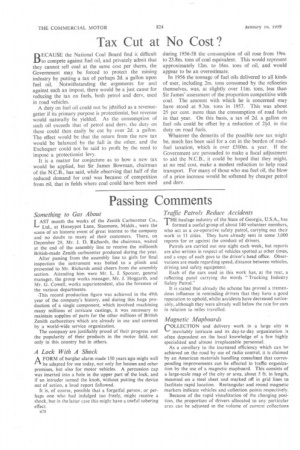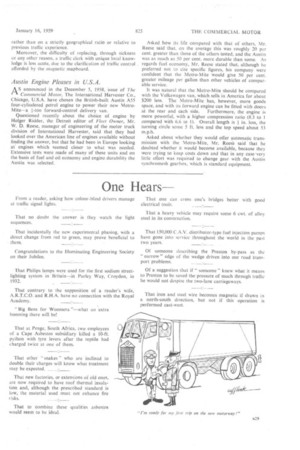Passing Comments
Page 32

Page 33

If you've noticed an error in this article please click here to report it so we can fix it.
Something to Gas About
LAST month the works of the Zenith Carburetter Co., Ltd., at Honeypot Lane, Startmore, Middx., were the scene of an historic event of great interest to the company and no doubt to many of their customers. There, on December 29, Mr. J. D. Richards, the chairman, waited at the end of the assembly line to receive the millionth British-made Zenith carburetter produced during the year.
After passing from the assembly line to girls for final inspection the instrument was bolted to a plinth and presented to Mr. Richards amid cheers from the assembly section. Attending him were Mr. L. J. Spencer, general manager, the group works manager, Mr. J. Hoggarth. and Mr. G. Cowell, works superintendent, also the foremen of the various departments.
This record production figure was achieved in the 49th year of the company's history, and during this huge production of a single component, which involved machining many millions of intricate castings, it was necessary to maintain supplies of parts for the other millions of British Zenith carburetters which are already in use and covered by a world-wide service organization.
The company are justifiably proud of their progress and the popularity of their products in the motor field, not only in this country but in others.
A Lock With A Shock
A FORM of burglar alarm made 150 years ago might well " be adapted for use today, not only for houses and other premises, but also for motor vehicles. A percussion cap was inserted into a hole in the upper part of the lock, and if an intruder turned the knob, without putting the device out of action, a loud report followed.
It is, of course, possible that a forgetful person, or perhaps one who had indulged too freely, might receive a shock, but in the latter case this might have a useful sobering effect.
Traffic Patrols Reduce Accidents
THE haulage industry of the State of Georgia, U.S.A., has formed a useful group of about 140 volunteer members, who act as a co-operative safety patrol, carrying out their work in 11 cities. They have already sent in some 3,000 reports for or against the conduct of drivers.
Patrols are carried out one night each week, but reports are also written in respect of vehicles spotted at other times, and a copy of each goes to the driver's head office. Observations are made regarding speed, distance between vehicles, driving and safety equipment.
Each of the cars used in this work has, at the rear, a reflecting panel carrying the words "Trucking Industry Safety Patrol."
It is stated that already the scheme has proved a tremendous influence in reminding drivers that they have a good reputation to uphold, whilst accidents have decreased noticeably, although they were already well below the rate for cars in relation to miles travelled.
Magnetic Mapboards
COLLECTION and delivery work in a large city is inevitably intricate and its day-to-day organization is often dependent on the local knowledge of a few highly specialized and almost irreplaceable personnel.
As a corollary to the increased efficiency which can be achieved on the road by use of radio control, it is claimed by an American materials handling consultant that corresponding improvements can be effected in traffic organization by the use of a magnetic mapboard. This consists of a large-scale map of the city or area, about 5 ft. in length, mounted on a steel sheet and marked off in grid lines to facilitate rapid location. Rectangular and round magnetic markers indicate vehicles and collection points respectively.
Because of the rapid visualization of the changing position, the proportion of drivers allocated to any particular area can be adjusted to the volume of current collections rather than on a strictly geographical ratio or relative to previous traffic experience.
Moreover, the difficulty of replacing, through sickness or any other reason, a traffic clerk with unique local knowledge is less acute, due to the clarification of traffic control afforded by the magnetic mapboard.
Austin Engine Pleases in U.S.A.
AS announced in the December 5, 1958, issue of The . Commercial Motor, The International Harvester Co., Chicago, U.S.A. have chosen the British-built Austin A55 four-cylindered petrol engine to power their new MetroMite—a 1-ton forward-control delivery van.
Questioned recently about the choice of engine by Holger Ridder, the Detroit editor of Fleet Owner, Mr. W. D. Reese, manager of engineering of the motor truck division of International Harvester, said that they had looked over the American line of engines available without finding the answer, but that he had been in Europe looking at engines which seemed closer to what was needed. Extensive tests were made of many of these units and on the basis of fuel and oil economy and engine durability the Austin was selected. Asked how its life compared with that of others, Mr. Reese said that, on the average this was roughly 20 per cent. greater than those of the others tested, and the Austin was as much as 50 per cent. more durable than some. As regards fuel economy, Mr. Reese stated that, although he preferred not to cite specific figures, his company were confident that the Metro-Mite would give 50 per cent. greater mileage per gallon than other vehicles of comparable service.
It was natural that the Metro-Mite should be compared with the Volkswagen van, which sells in America for about S200 less. The Metro-Mite has, however, more goods space, and with its forward engine can be fitted with doors at the rear and each side. Furthermore, the engine is more powerful, with a higher compression ratio (8.3 to 1 compared with 6.6 to 1). Overall length is in. less, the turning circle some 5 ft. less and the top speed about 53 m.p.h.
Asked about whether they would offer automatic transmission with the Metro-Mite, Mr. Reese said that he doubted whether it would become available, because they were trying to keep costs down and that in any case very little effort was required to change gear with the Austin synchromesh gearbox, which is standard equipment.








































































































